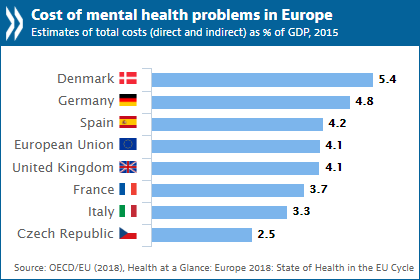Greater efforts to promote mental health and improve early diagnosis and treatment of those with mental illness would improve the lives of millions of Europeans and contribute to stronger economic and employment conditions, according to a new joint OECD/European Commission report.
Health at a Glance: Europe 2018 says that mental health problems, such as depression, anxiety disorders and alcohol and drug use disorders, affect more than one in six people across the European Union in any given year. Besides the impact on people’s well-being, the report estimates the total costs of mental ill-health at over EUR 600 billion – or more than 4% of GDP – across the 28 EU countries.
A large part of these costs are due to lower employment rates and productivity of people with mental health issues (1.6% of GDP or EUR 260 billion) and greater spending on social security programmes (1.2% of GDP or EUR 170 billion), with the rest being direct spending on health care (1.3% of GDP or EUR 190 billion).
“The heavy burdens of mental illness on individuals and society are not inevitable,” said OECD Secretary-General Angel Gurría. “While many European countries have put in place policies and programmes to address mental illness, much more can be done to promote and better manage mental health. We look forward to continue working with the European Commission to measure the state of health in European economies and the specific challenges they confront to deliver better health policies for better lives.”
Launching the report in Brussels, European Commissioner for Health and Food Safety Vytenis Andriukaitisadded: “The Health at a Glance report provides useful information for Member States to put a greater priority on the too often neglected burden of mental health problems on people’s life and on the economy. It makes a strong case for more coordinated actions to promote better mental health in schools and workplaces, but also among more vulnerable groups like unemployed people and elderly people.”


